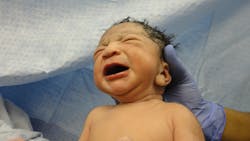An experimental form of gene therapy developed by a team of researchers from UCLA and Great Ormond Street Hospital in London has successfully treated 48 of 50 children born with a rare and deadly inherited disorder that leaves them without an immune system, according to a news release from UCLA.
Severe combined immunodeficiency due to adenosine deaminase deficiency, or ADA-SCID, is caused by mutations in the ADA gene that creates the enzyme adenosine deaminase, which is essential to a functioning immune system. For children with the condition, even day-to-day activities like going to school or playing with friends can lead to dangerous, life-threatening infections. If untreated, ADA-SCID can be fatal within the first two years of life.
The investigational gene therapy method involves first collecting some of the child’s blood-forming stem cells, which have the potential to create all types of blood and immune cells. Next, using an approach developed by the research team, a new copy of the ADA gene is delivered into the stem cells by a modified lentivirus, or “viral vector.” The corrected cells are then returned to the child’s body, where they are intended to produce a continual supply of healthy immune cells capable of fighting infection.
In a study published in the New England Journal of Medicine, researchers report two- and three-year outcomes for children treated with the investigational lentiviral gene therapy in clinical trials at Great Ormond Street Hospital (GOSH), UCLA Mattel Children’s Hospital and the National Institutes of Health between 2012 and 2017.
No complications or treatment-limiting events were reported among the patients. Most adverse events were mild or moderate and were considered to be related to routine procedures performed in preparation for the experimental gene therapy treatment or effects of the immune system rebuilding.
The investigational gene therapy — a one-time procedure that the researchers say may provide lifelong results — is a welcome potential new treatment option for children with ADA-SCID, who otherwise must undergo once- or twice-weekly injections of the ADA enzyme until a matched bone marrow donor, usually a close family member, can be found. If a donor is not available, patients require lifelong injections, along with antibiotics, antifungal medications and monthly infusions of immunoglobulin, which contains infection-fighting antibodies. These treatments are expensive and therefore out of reach for patients in many countries.

